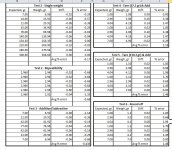quneur
Member
I have a question; some reloading manufacturers import their products from overseas. The actual manufacturer will also re-brand them for sale. Specifically, the Hornady GS-1500 and AWS-100. The pictures are here:
Cabela's: Hornady® GS-1500 Electronic Scale
American Weigh Scales - Digital Scales Wholesale
Note: the AWS is listed in the gun powder scale category.
I order the AWS on ebay for a third less than listed on the company website but still waiting to receive it. Anyone used it? I got the Lee safety scale from the kit but wanted something to re-check after charging and before seating.
Cabela's: Hornady® GS-1500 Electronic Scale
American Weigh Scales - Digital Scales Wholesale
Note: the AWS is listed in the gun powder scale category.
I order the AWS on ebay for a third less than listed on the company website but still waiting to receive it. Anyone used it? I got the Lee safety scale from the kit but wanted something to re-check after charging and before seating.

